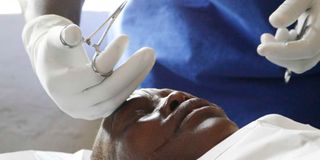We need a fund for neglected tropical diseases

A woman undergoes surgery on her left eye to treat Trachoma at the Kajiado District Hospital. Trachoma leads to blindness if untreated. File | Nation Media Group
What you need to know:
- NTDs are a group of parasitic, bacterial and viral chronic debilitating yet preventable and treatable infections that afflict more than 1.5 billion people worldwide.
- Accounting for up to 40 per cent of the burden, Africa bears the heaviest brunt of these infections, a situation made worse by inefficient healthcare system and poverty.
As the Covid-19 rages on with its impact on economies reverberating across the world, Neglected Tropical Diseases (NTD) are the latest casualties of the ripple effects of the coronavirus pandemic.
Unfortunately, the United Kingdom has chosen this time to slash funding worth Sh23 billion that had been set aside to tackle NTDs in several countries, including Kenya. This turn of events is devastating. It is feared that the effects of the withdrawal of funding will manifest in the days to come, especially in the already impoverished low- and middle-income countries.
NTDs are a group of parasitic, bacterial and viral chronic debilitating yet preventable and treatable infections that afflict more than 1.5 billion people worldwide. Accounting for up to 40 per cent of the burden, Africa — in particular rural areas and urban informal settlements — bears the heaviest brunt of these infections, a situation made worse by inefficient healthcare system and poverty.
Among these diseases are intestinal worm infestation, which is linked to malnutrition among children; trachoma, a leading cause of blindness; and elephantiasis, which causes swelling of legs.
These diseases are collectively referred to as “neglected” because they have often garnered less attention in terms of funding and coverage compared to malaria, HIV/Aids, tuberculosis and non-communicable diseases such as cancer, heart ailments and diabetes.
Eradication of diseases
This is not in congruence with the scale of socioeconomic devastation they present by hindering holistic child development and economic participation of affected adults, not to mention the psychological distress to them.
Availability of funds for essential therapeutics and research is one of the most critical determinants in disease control, prevention and eventual elimination. In 2015, according to the Uniting to Combat Neglected Tropical Diseases, a group of partners working to control, eliminate and eradicate NTDs, 630 million of the people who needed medical treatment for the diseases in Africa were able to access it. As of 2019, following wide accessibility of the relevant drugs, the number of people in need fell to fewer than 612 million.
This is a demonstration that, with steady funding, the prospects of eradication of these diseases are possible in low- and middle-income countries.
However, with the massive financial cuts by the UK and lack of a robust fund that would ensure there is no disruption in the supply of medicines, the gains made over the years risk being undone. Therefore, the government ought to mobilise resources and establish a national fund to beef up and sustain campaigns aimed at controlling, preventing and ultimately eliminating NTDs.
With the socioeconomic burden posed by NTDs, the government’s effort towards making universal health coverage a reality will be futile if deserved attention is not extended to these group of diseases.
Dr Kerima (PhD) is a biochemist; [email protected] @KerimaZablon





